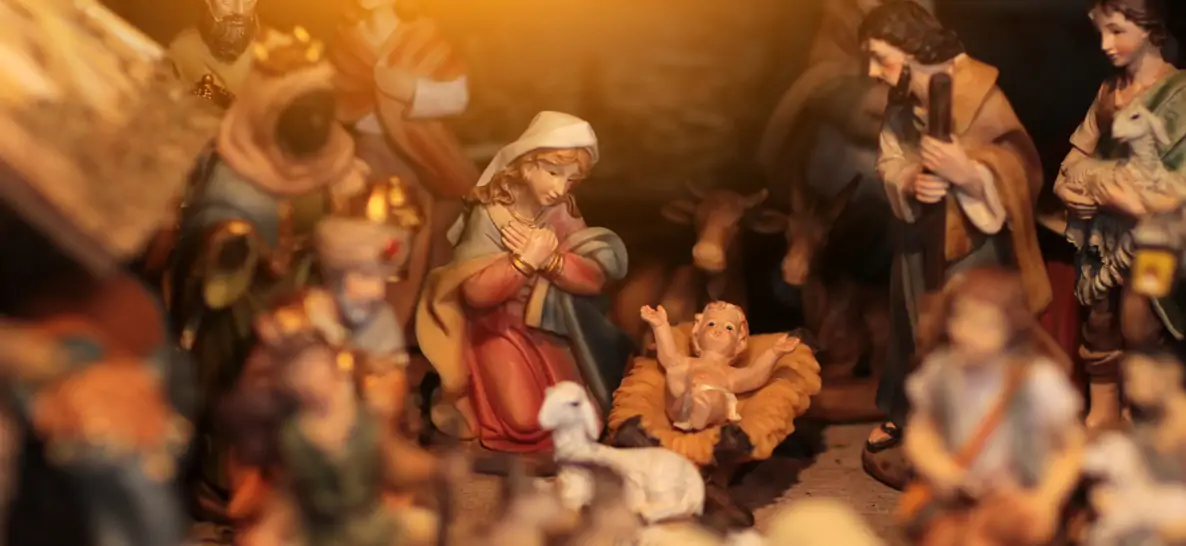
With Christmas right around the corner, it’s time to blow the dust off your VHS of Elf (if you haven’t already), make some decadent hot chocolate, and get ready to celebrate the birth of Jesus.
That would be a thoroughly typical American Christmas: extravagance, a little decadence to add some holiday weight, and some Jesus thrown in for good measure.
Having grown up in the midst of the grand march of commercial and materialistic Christmas to become a three month binge on lights, presents and sweets, it would be easy to accept this as the new normal. There are a few options here: you can embrace it and become that person who plays Christmas music starting right after Halloween, you can act as a crusader against the watered-down Christmas you see around you and display your “Jesus is the Reason” bumper sticker proudly, or, well, you can just kind of go with the flow.
There is another way though. We could go back to celebrating and thinking about Christmas the way so many Christians did before us. And if we start to celebrate Christmas the way it was celebrated hundreds of years ago, we will begin to have a more well-rounded picture of what exactly it means to celebrate a holy God who came in the flesh as a poor, crying baby wrapped in swaddling clothes in Bethlehem so many years ago.
Here are a few things church history can teach us about celebrating Christmas:
Christmas is a Time to Prepare and Repent
The American cultural concept of Christmas is one of unfiltered pursuit of happiness. Lights make us happy. Sweets and treats make us happy. Days off make us happy. But, most importantly, presents make us happy. We are infatuated with getting more stuff. Wrap that Lexus in a bow!
Yet, throughout Church history, Advent, as a prelude to Christmas, has not been about stampeding Black Fridays and piling stuff under a fake tree. Advent has been about preparation, fasting and repentance.
What you would do if a movie star or a powerful politician just announced he or she was going to join you for dinner tonight? You would tidy up the house, throw all your junk in a random closet and set a nice table. You would go all-out to show that this person coming over is important.
For Christians, Advent should be like getting ready for a dinner guest named Jesus, who we will celebrate for coming into the world in the flesh. If we view Christmas as our time to worship and celebrate God “moving into our neighborhood,” our actions should be radically different. We need to assess our spiritual lives, pray and prepare our bodies and souls for the coming of our Lord.
The Incarnation is Essential
In the birth of Jesus, God became flesh, and this is so mysterious and so vital to every other piece of Christian theology and practice that we need to try and let the gravity of it sink into our souls. Really, the whole of Christianity rests on the Incarnation, for without a God in the flesh, all other Christian beliefs fall apart.
One of the ancient ways Christians have remembered the power and weight of the Incarnation is through the “O Antiphons,” a week of prayer that leads up to Christmas Eve and focuses on the deep spiritual needs the Incarnation has met for us as Christ followers. In the Incarnation, Christ has become our Wisdom, our King, our Light, our Emmanuel. The “O Antiphons” prayerfully ponder these things, and more.
While the “O Antiphons” are still present in some Christian traditions today, they have ceased to be used, for the most part, in Protestant streams of the faith. But they still seep in through Christmas hymns. “O Come, O Come, Emmanuel,” is a paraphrase of the O Antiphons. Whether by praying the “O Antiphons” or singing hymns, pondering the Incarnation will prepare us for the Christmas season.
Christmas is More Than a Day
Christmas is often celebrated for one gloriously festive day before we move on. But in the Church calendar, Christmas is just the start of the Christmas season. For centuries, Christians took about two weeks to celebrate and worship God for coming into this world, but we now have a ton of build up to the day then just move on to the next big thing: New Year’s Eve!
Celebrating Christmas as a season gives Christians the opportunity to stay in the mood of pondering the coming of Christ in the flesh a bit more and soak in what it means for Jesus to grow up.
Knowing what we do about Jesus from Scriptures, He would have been about 2 years old when the Magi came to bring Him gifts. The image we have of Jesus cooing in his mother’s arms, barely a day old, while some wise men bestow presents upon this radiant infant is flat-out wrong. Jesus would have, presumably, had a much more toddler-like reaction to those gifts of gold, frankincense and myrrh.
Can you imagine a nearly 2-year-old Jesus excited and a bit bewildered over these gifts? We should, because that is part of the mystery of the Incarnation. Jesus did not just turn from “little Lord Jesus” into an adult. He was once a toddler who could have said to His father Joseph in a squeaky toddler voice, “Abba, what’s myrrh?”
Extending Christmas from a day to a season allows us the time and space to contemplate the gifts of the magi, the growth of Jesus in wisdom and stature, and what it means for God to come in human form and experience the joy of gift-giving, the curiosity of travelers from a faraway land and the fear of having to be quickly swept away to Egypt.
As Christmas approaches, it is easy to fall into the trap of the ordinary. To deck the halls and eat cookies and carry on as usual. Yet Church history teaches us that Christmas is anything but ordinary and usual. It is a time when God literally came in human form, spent time in a womb, was birthed, cried, grew up and learned how to be human. It is a time truly demands our preparation to worship, our reflection on the Incarnation and our meditation on this history-altering event.






















